Legal Memorandum: Analysis of Duty of Fair Representation in Labor Law
VerifiedAdded on 2020/04/15
|8
|1890
|239
Report
AI Summary
This legal memorandum examines the duty of fair representation (DFR) in the context of a case involving a police officer and their union, POAM. The memorandum addresses the legal obligations of a union to represent its members fairly, impartially, and without discrimination. It explores the issues presented, including whether the union breached its DFR by not taking the officer's disciplinary case to arbitration. The analysis delves into relevant Michigan and federal labor laws, including the National Labor Relations Act and cases like Airline Pilots Association International v. O'Neill, to determine the scope of the DFR and the standards for proving a breach. The memorandum applies these legal principles to the facts of the case, discussing the union's actions, the employee's grievances, and the potential remedies. It concludes by emphasizing the importance of fair treatment and the ethical responsibilities of legal professionals in representing those who cannot afford it.
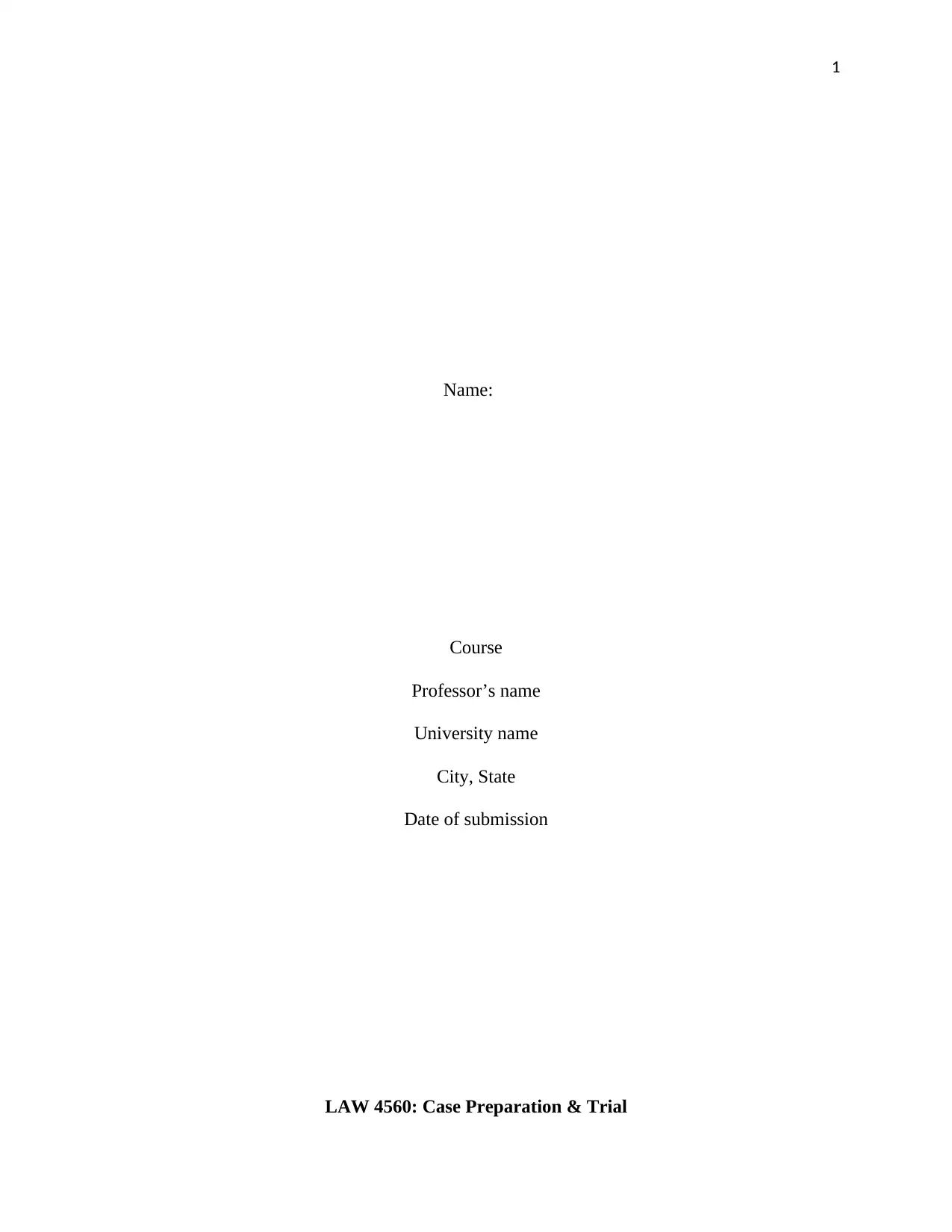
1
Name:
Course
Professor’s name
University name
City, State
Date of submission
LAW 4560: Case Preparation & Trial
Name:
Course
Professor’s name
University name
City, State
Date of submission
LAW 4560: Case Preparation & Trial
Paraphrase This Document
Need a fresh take? Get an instant paraphrase of this document with our AI Paraphraser
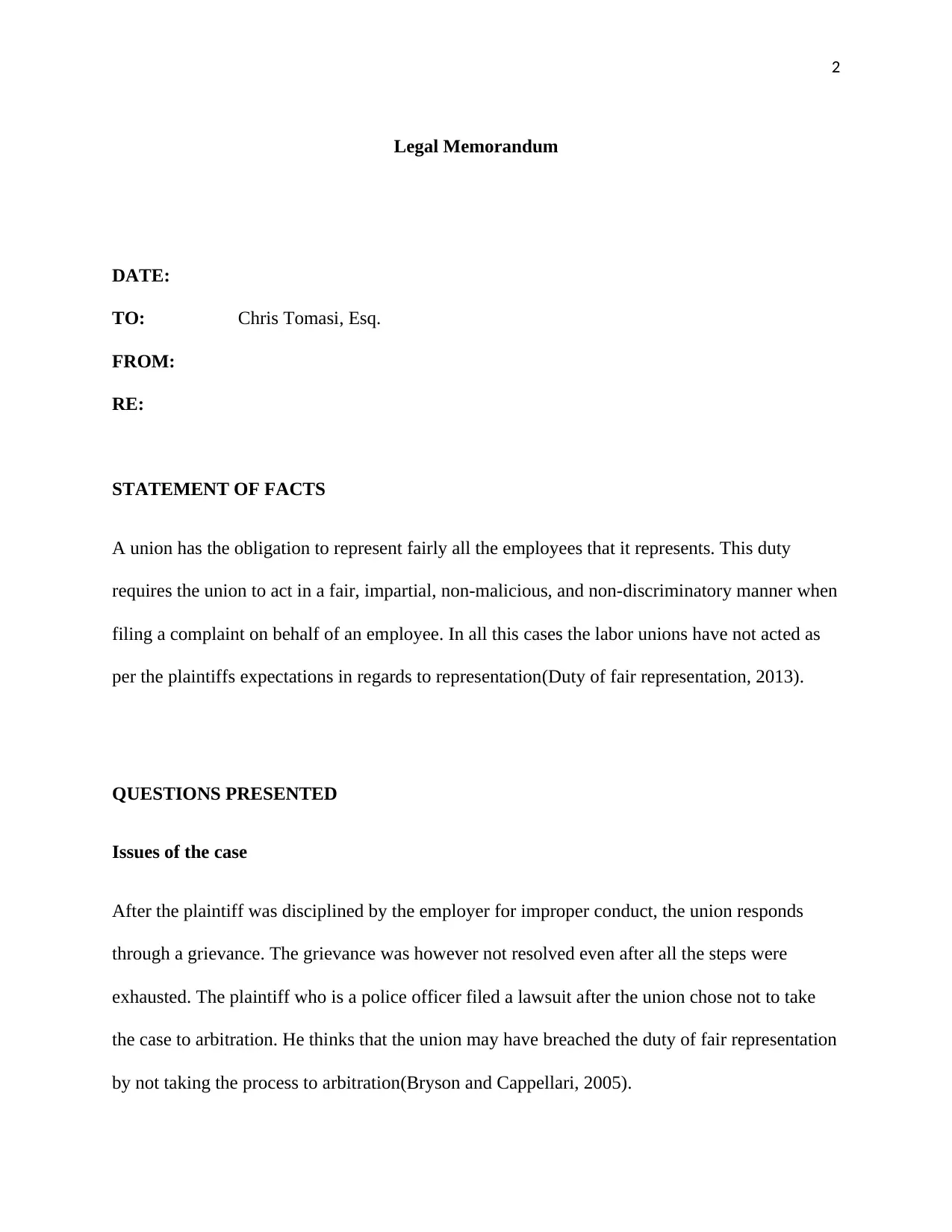
2
Legal Memorandum
DATE:
TO: Chris Tomasi, Esq.
FROM:
RE:
STATEMENT OF FACTS
A union has the obligation to represent fairly all the employees that it represents. This duty
requires the union to act in a fair, impartial, non-malicious, and non-discriminatory manner when
filing a complaint on behalf of an employee. In all this cases the labor unions have not acted as
per the plaintiffs expectations in regards to representation(Duty of fair representation, 2013).
QUESTIONS PRESENTED
Issues of the case
After the plaintiff was disciplined by the employer for improper conduct, the union responds
through a grievance. The grievance was however not resolved even after all the steps were
exhausted. The plaintiff who is a police officer filed a lawsuit after the union chose not to take
the case to arbitration. He thinks that the union may have breached the duty of fair representation
by not taking the process to arbitration(Bryson and Cappellari, 2005).
Legal Memorandum
DATE:
TO: Chris Tomasi, Esq.
FROM:
RE:
STATEMENT OF FACTS
A union has the obligation to represent fairly all the employees that it represents. This duty
requires the union to act in a fair, impartial, non-malicious, and non-discriminatory manner when
filing a complaint on behalf of an employee. In all this cases the labor unions have not acted as
per the plaintiffs expectations in regards to representation(Duty of fair representation, 2013).
QUESTIONS PRESENTED
Issues of the case
After the plaintiff was disciplined by the employer for improper conduct, the union responds
through a grievance. The grievance was however not resolved even after all the steps were
exhausted. The plaintiff who is a police officer filed a lawsuit after the union chose not to take
the case to arbitration. He thinks that the union may have breached the duty of fair representation
by not taking the process to arbitration(Bryson and Cappellari, 2005).
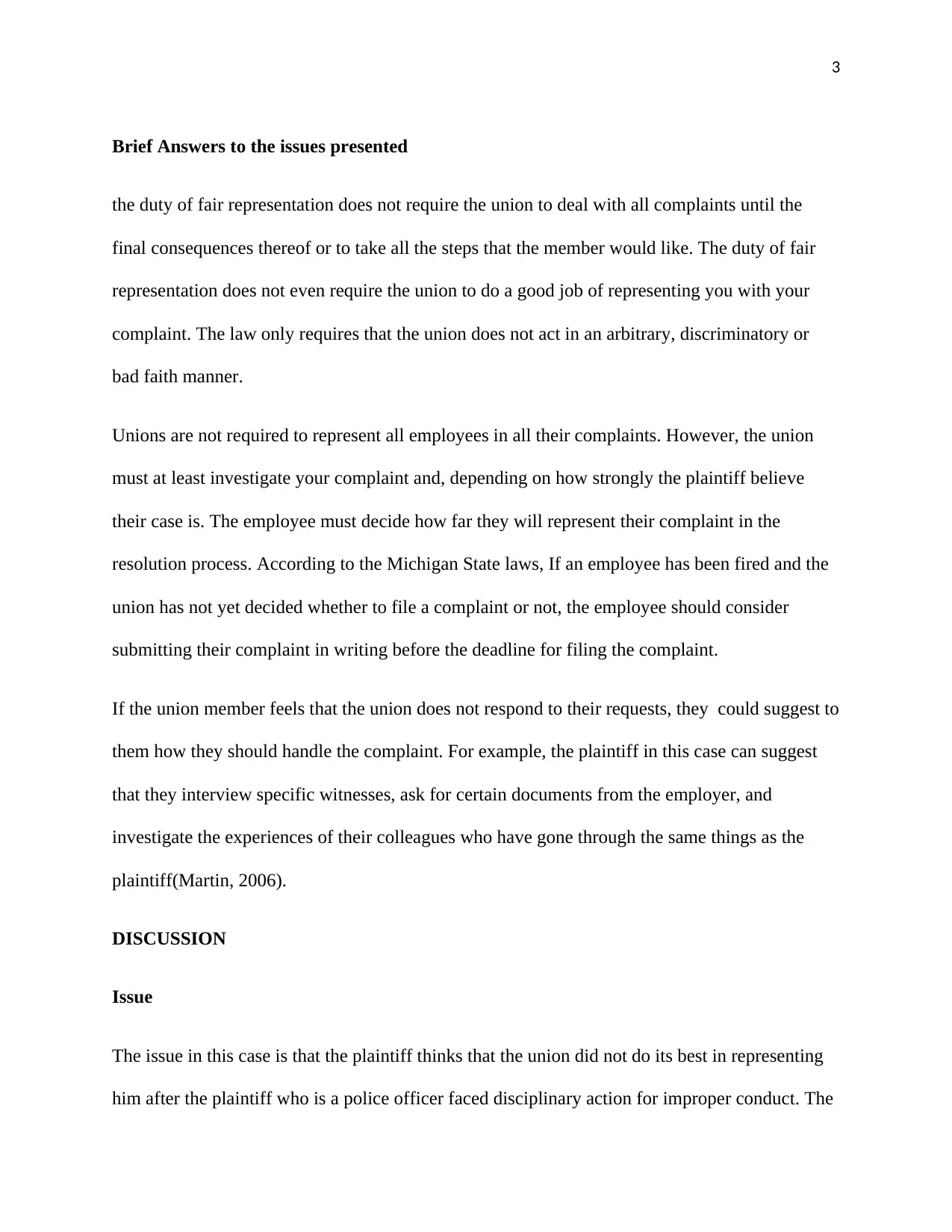
3
Brief Answers to the issues presented
the duty of fair representation does not require the union to deal with all complaints until the
final consequences thereof or to take all the steps that the member would like. The duty of fair
representation does not even require the union to do a good job of representing you with your
complaint. The law only requires that the union does not act in an arbitrary, discriminatory or
bad faith manner.
Unions are not required to represent all employees in all their complaints. However, the union
must at least investigate your complaint and, depending on how strongly the plaintiff believe
their case is. The employee must decide how far they will represent their complaint in the
resolution process. According to the Michigan State laws, If an employee has been fired and the
union has not yet decided whether to file a complaint or not, the employee should consider
submitting their complaint in writing before the deadline for filing the complaint.
If the union member feels that the union does not respond to their requests, they could suggest to
them how they should handle the complaint. For example, the plaintiff in this case can suggest
that they interview specific witnesses, ask for certain documents from the employer, and
investigate the experiences of their colleagues who have gone through the same things as the
plaintiff(Martin, 2006).
DISCUSSION
Issue
The issue in this case is that the plaintiff thinks that the union did not do its best in representing
him after the plaintiff who is a police officer faced disciplinary action for improper conduct. The
Brief Answers to the issues presented
the duty of fair representation does not require the union to deal with all complaints until the
final consequences thereof or to take all the steps that the member would like. The duty of fair
representation does not even require the union to do a good job of representing you with your
complaint. The law only requires that the union does not act in an arbitrary, discriminatory or
bad faith manner.
Unions are not required to represent all employees in all their complaints. However, the union
must at least investigate your complaint and, depending on how strongly the plaintiff believe
their case is. The employee must decide how far they will represent their complaint in the
resolution process. According to the Michigan State laws, If an employee has been fired and the
union has not yet decided whether to file a complaint or not, the employee should consider
submitting their complaint in writing before the deadline for filing the complaint.
If the union member feels that the union does not respond to their requests, they could suggest to
them how they should handle the complaint. For example, the plaintiff in this case can suggest
that they interview specific witnesses, ask for certain documents from the employer, and
investigate the experiences of their colleagues who have gone through the same things as the
plaintiff(Martin, 2006).
DISCUSSION
Issue
The issue in this case is that the plaintiff thinks that the union did not do its best in representing
him after the plaintiff who is a police officer faced disciplinary action for improper conduct. The
⊘ This is a preview!⊘
Do you want full access?
Subscribe today to unlock all pages.

Trusted by 1+ million students worldwide
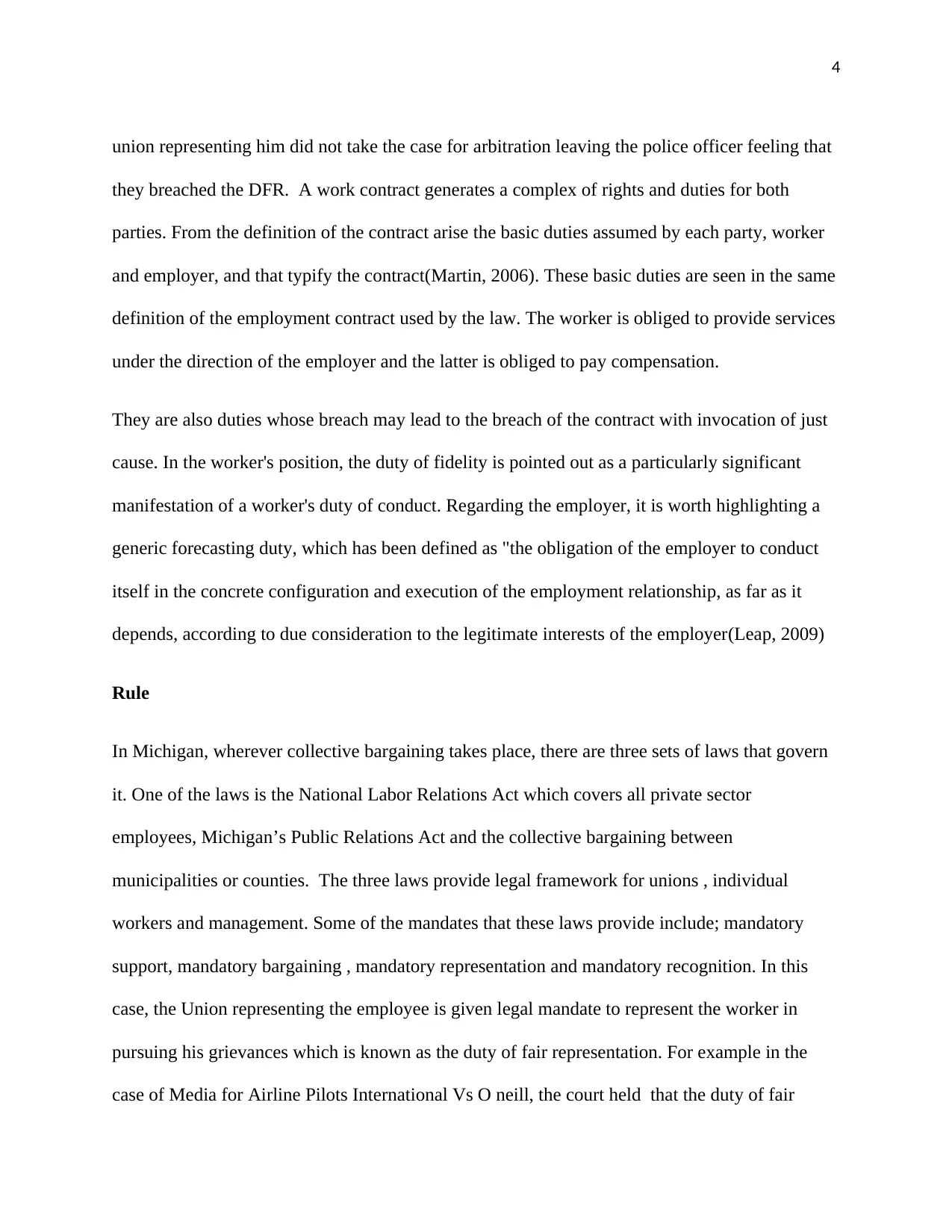
4
union representing him did not take the case for arbitration leaving the police officer feeling that
they breached the DFR. A work contract generates a complex of rights and duties for both
parties. From the definition of the contract arise the basic duties assumed by each party, worker
and employer, and that typify the contract(Martin, 2006). These basic duties are seen in the same
definition of the employment contract used by the law. The worker is obliged to provide services
under the direction of the employer and the latter is obliged to pay compensation.
They are also duties whose breach may lead to the breach of the contract with invocation of just
cause. In the worker's position, the duty of fidelity is pointed out as a particularly significant
manifestation of a worker's duty of conduct. Regarding the employer, it is worth highlighting a
generic forecasting duty, which has been defined as "the obligation of the employer to conduct
itself in the concrete configuration and execution of the employment relationship, as far as it
depends, according to due consideration to the legitimate interests of the employer(Leap, 2009)
Rule
In Michigan, wherever collective bargaining takes place, there are three sets of laws that govern
it. One of the laws is the National Labor Relations Act which covers all private sector
employees, Michigan’s Public Relations Act and the collective bargaining between
municipalities or counties. The three laws provide legal framework for unions , individual
workers and management. Some of the mandates that these laws provide include; mandatory
support, mandatory bargaining , mandatory representation and mandatory recognition. In this
case, the Union representing the employee is given legal mandate to represent the worker in
pursuing his grievances which is known as the duty of fair representation. For example in the
case of Media for Airline Pilots International Vs O neill, the court held that the duty of fair
union representing him did not take the case for arbitration leaving the police officer feeling that
they breached the DFR. A work contract generates a complex of rights and duties for both
parties. From the definition of the contract arise the basic duties assumed by each party, worker
and employer, and that typify the contract(Martin, 2006). These basic duties are seen in the same
definition of the employment contract used by the law. The worker is obliged to provide services
under the direction of the employer and the latter is obliged to pay compensation.
They are also duties whose breach may lead to the breach of the contract with invocation of just
cause. In the worker's position, the duty of fidelity is pointed out as a particularly significant
manifestation of a worker's duty of conduct. Regarding the employer, it is worth highlighting a
generic forecasting duty, which has been defined as "the obligation of the employer to conduct
itself in the concrete configuration and execution of the employment relationship, as far as it
depends, according to due consideration to the legitimate interests of the employer(Leap, 2009)
Rule
In Michigan, wherever collective bargaining takes place, there are three sets of laws that govern
it. One of the laws is the National Labor Relations Act which covers all private sector
employees, Michigan’s Public Relations Act and the collective bargaining between
municipalities or counties. The three laws provide legal framework for unions , individual
workers and management. Some of the mandates that these laws provide include; mandatory
support, mandatory bargaining , mandatory representation and mandatory recognition. In this
case, the Union representing the employee is given legal mandate to represent the worker in
pursuing his grievances which is known as the duty of fair representation. For example in the
case of Media for Airline Pilots International Vs O neill, the court held that the duty of fair
Paraphrase This Document
Need a fresh take? Get an instant paraphrase of this document with our AI Paraphraser
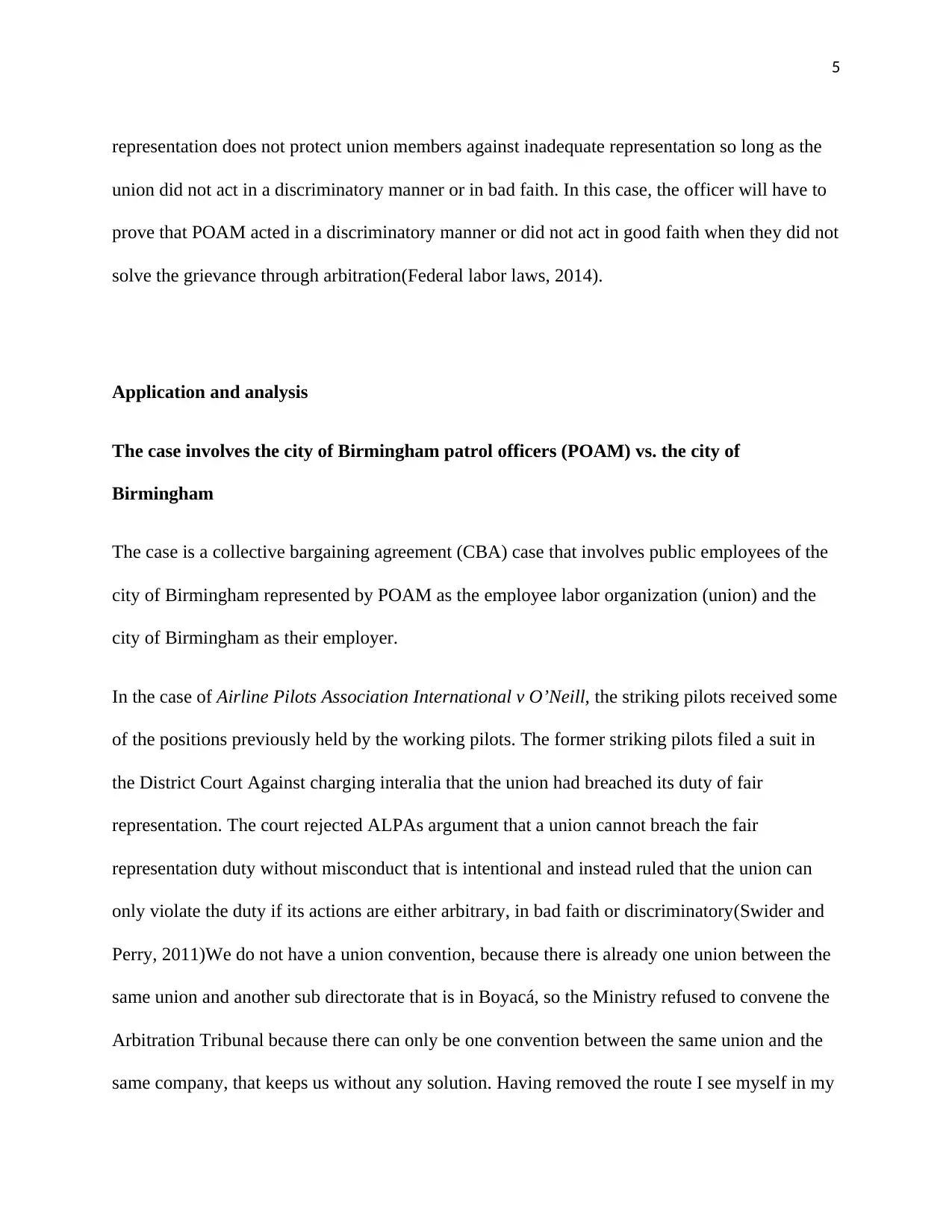
5
representation does not protect union members against inadequate representation so long as the
union did not act in a discriminatory manner or in bad faith. In this case, the officer will have to
prove that POAM acted in a discriminatory manner or did not act in good faith when they did not
solve the grievance through arbitration(Federal labor laws, 2014).
Application and analysis
The case involves the city of Birmingham patrol officers (POAM) vs. the city of
Birmingham
The case is a collective bargaining agreement (CBA) case that involves public employees of the
city of Birmingham represented by POAM as the employee labor organization (union) and the
city of Birmingham as their employer.
In the case of Airline Pilots Association International v O’Neill, the striking pilots received some
of the positions previously held by the working pilots. The former striking pilots filed a suit in
the District Court Against charging interalia that the union had breached its duty of fair
representation. The court rejected ALPAs argument that a union cannot breach the fair
representation duty without misconduct that is intentional and instead ruled that the union can
only violate the duty if its actions are either arbitrary, in bad faith or discriminatory(Swider and
Perry, 2011)We do not have a union convention, because there is already one union between the
same union and another sub directorate that is in Boyacá, so the Ministry refused to convene the
Arbitration Tribunal because there can only be one convention between the same union and the
same company, that keeps us without any solution. Having removed the route I see myself in my
representation does not protect union members against inadequate representation so long as the
union did not act in a discriminatory manner or in bad faith. In this case, the officer will have to
prove that POAM acted in a discriminatory manner or did not act in good faith when they did not
solve the grievance through arbitration(Federal labor laws, 2014).
Application and analysis
The case involves the city of Birmingham patrol officers (POAM) vs. the city of
Birmingham
The case is a collective bargaining agreement (CBA) case that involves public employees of the
city of Birmingham represented by POAM as the employee labor organization (union) and the
city of Birmingham as their employer.
In the case of Airline Pilots Association International v O’Neill, the striking pilots received some
of the positions previously held by the working pilots. The former striking pilots filed a suit in
the District Court Against charging interalia that the union had breached its duty of fair
representation. The court rejected ALPAs argument that a union cannot breach the fair
representation duty without misconduct that is intentional and instead ruled that the union can
only violate the duty if its actions are either arbitrary, in bad faith or discriminatory(Swider and
Perry, 2011)We do not have a union convention, because there is already one union between the
same union and another sub directorate that is in Boyacá, so the Ministry refused to convene the
Arbitration Tribunal because there can only be one convention between the same union and the
same company, that keeps us without any solution. Having removed the route I see myself in my
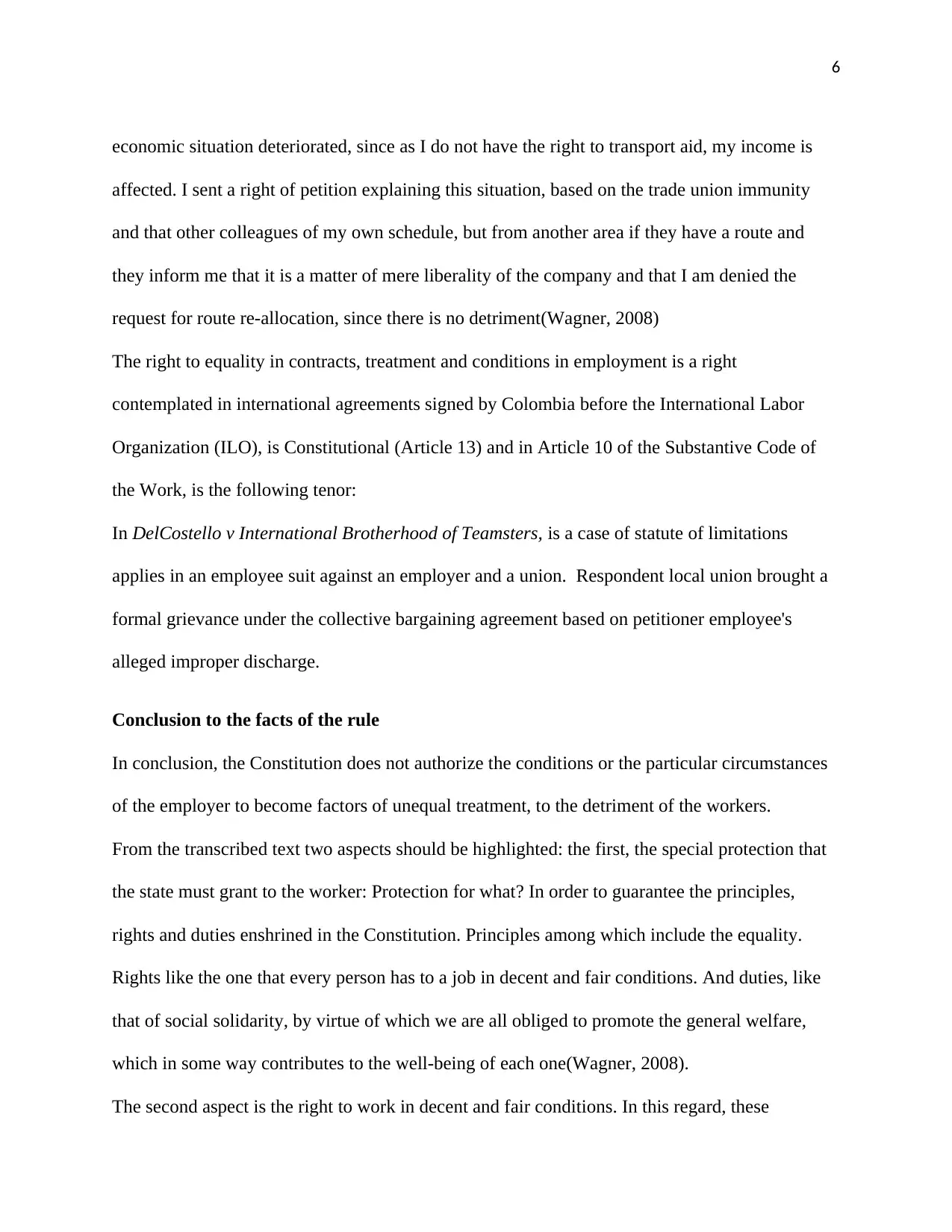
6
economic situation deteriorated, since as I do not have the right to transport aid, my income is
affected. I sent a right of petition explaining this situation, based on the trade union immunity
and that other colleagues of my own schedule, but from another area if they have a route and
they inform me that it is a matter of mere liberality of the company and that I am denied the
request for route re-allocation, since there is no detriment(Wagner, 2008)
The right to equality in contracts, treatment and conditions in employment is a right
contemplated in international agreements signed by Colombia before the International Labor
Organization (ILO), is Constitutional (Article 13) and in Article 10 of the Substantive Code of
the Work, is the following tenor:
In DelCostello v International Brotherhood of Teamsters, is a case of statute of limitations
applies in an employee suit against an employer and a union. Respondent local union brought a
formal grievance under the collective bargaining agreement based on petitioner employee's
alleged improper discharge.
Conclusion to the facts of the rule
In conclusion, the Constitution does not authorize the conditions or the particular circumstances
of the employer to become factors of unequal treatment, to the detriment of the workers.
From the transcribed text two aspects should be highlighted: the first, the special protection that
the state must grant to the worker: Protection for what? In order to guarantee the principles,
rights and duties enshrined in the Constitution. Principles among which include the equality.
Rights like the one that every person has to a job in decent and fair conditions. And duties, like
that of social solidarity, by virtue of which we are all obliged to promote the general welfare,
which in some way contributes to the well-being of each one(Wagner, 2008).
The second aspect is the right to work in decent and fair conditions. In this regard, these
economic situation deteriorated, since as I do not have the right to transport aid, my income is
affected. I sent a right of petition explaining this situation, based on the trade union immunity
and that other colleagues of my own schedule, but from another area if they have a route and
they inform me that it is a matter of mere liberality of the company and that I am denied the
request for route re-allocation, since there is no detriment(Wagner, 2008)
The right to equality in contracts, treatment and conditions in employment is a right
contemplated in international agreements signed by Colombia before the International Labor
Organization (ILO), is Constitutional (Article 13) and in Article 10 of the Substantive Code of
the Work, is the following tenor:
In DelCostello v International Brotherhood of Teamsters, is a case of statute of limitations
applies in an employee suit against an employer and a union. Respondent local union brought a
formal grievance under the collective bargaining agreement based on petitioner employee's
alleged improper discharge.
Conclusion to the facts of the rule
In conclusion, the Constitution does not authorize the conditions or the particular circumstances
of the employer to become factors of unequal treatment, to the detriment of the workers.
From the transcribed text two aspects should be highlighted: the first, the special protection that
the state must grant to the worker: Protection for what? In order to guarantee the principles,
rights and duties enshrined in the Constitution. Principles among which include the equality.
Rights like the one that every person has to a job in decent and fair conditions. And duties, like
that of social solidarity, by virtue of which we are all obliged to promote the general welfare,
which in some way contributes to the well-being of each one(Wagner, 2008).
The second aspect is the right to work in decent and fair conditions. In this regard, these
⊘ This is a preview!⊘
Do you want full access?
Subscribe today to unlock all pages.

Trusted by 1+ million students worldwide
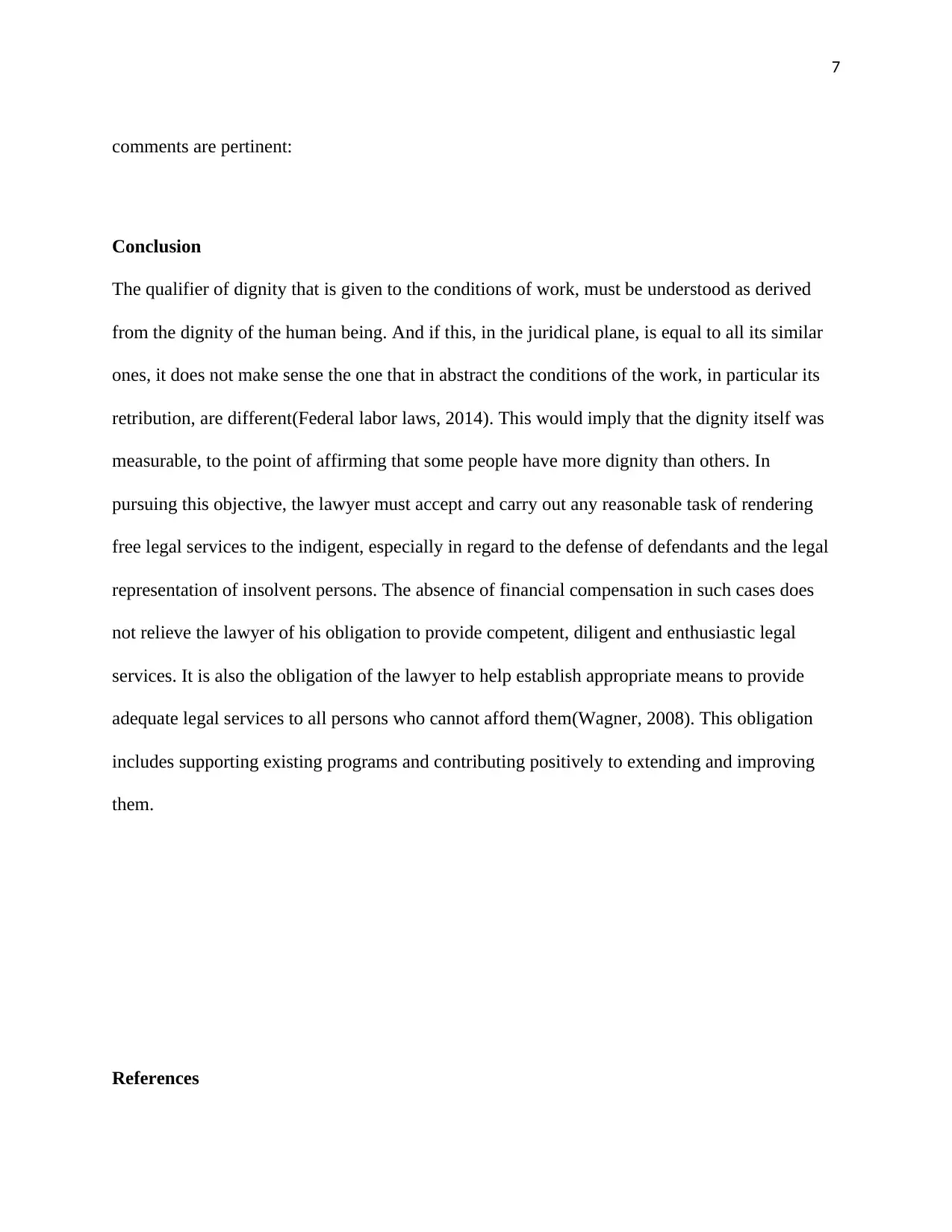
7
comments are pertinent:
Conclusion
The qualifier of dignity that is given to the conditions of work, must be understood as derived
from the dignity of the human being. And if this, in the juridical plane, is equal to all its similar
ones, it does not make sense the one that in abstract the conditions of the work, in particular its
retribution, are different(Federal labor laws, 2014). This would imply that the dignity itself was
measurable, to the point of affirming that some people have more dignity than others. In
pursuing this objective, the lawyer must accept and carry out any reasonable task of rendering
free legal services to the indigent, especially in regard to the defense of defendants and the legal
representation of insolvent persons. The absence of financial compensation in such cases does
not relieve the lawyer of his obligation to provide competent, diligent and enthusiastic legal
services. It is also the obligation of the lawyer to help establish appropriate means to provide
adequate legal services to all persons who cannot afford them(Wagner, 2008). This obligation
includes supporting existing programs and contributing positively to extending and improving
them.
References
comments are pertinent:
Conclusion
The qualifier of dignity that is given to the conditions of work, must be understood as derived
from the dignity of the human being. And if this, in the juridical plane, is equal to all its similar
ones, it does not make sense the one that in abstract the conditions of the work, in particular its
retribution, are different(Federal labor laws, 2014). This would imply that the dignity itself was
measurable, to the point of affirming that some people have more dignity than others. In
pursuing this objective, the lawyer must accept and carry out any reasonable task of rendering
free legal services to the indigent, especially in regard to the defense of defendants and the legal
representation of insolvent persons. The absence of financial compensation in such cases does
not relieve the lawyer of his obligation to provide competent, diligent and enthusiastic legal
services. It is also the obligation of the lawyer to help establish appropriate means to provide
adequate legal services to all persons who cannot afford them(Wagner, 2008). This obligation
includes supporting existing programs and contributing positively to extending and improving
them.
References
Paraphrase This Document
Need a fresh take? Get an instant paraphrase of this document with our AI Paraphraser
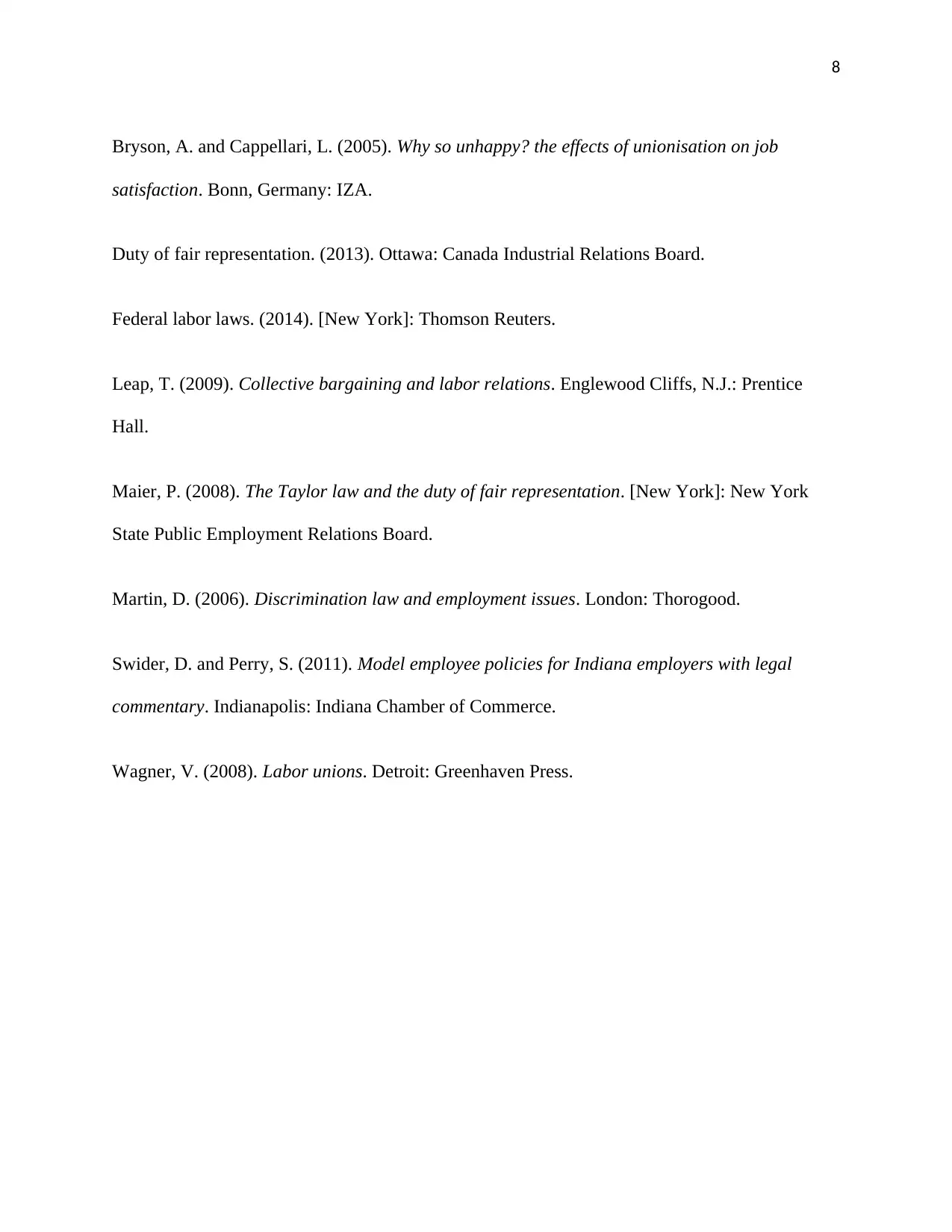
8
Bryson, A. and Cappellari, L. (2005). Why so unhappy? the effects of unionisation on job
satisfaction. Bonn, Germany: IZA.
Duty of fair representation. (2013). Ottawa: Canada Industrial Relations Board.
Federal labor laws. (2014). [New York]: Thomson Reuters.
Leap, T. (2009). Collective bargaining and labor relations. Englewood Cliffs, N.J.: Prentice
Hall.
Maier, P. (2008). The Taylor law and the duty of fair representation. [New York]: New York
State Public Employment Relations Board.
Martin, D. (2006). Discrimination law and employment issues. London: Thorogood.
Swider, D. and Perry, S. (2011). Model employee policies for Indiana employers with legal
commentary. Indianapolis: Indiana Chamber of Commerce.
Wagner, V. (2008). Labor unions. Detroit: Greenhaven Press.
Bryson, A. and Cappellari, L. (2005). Why so unhappy? the effects of unionisation on job
satisfaction. Bonn, Germany: IZA.
Duty of fair representation. (2013). Ottawa: Canada Industrial Relations Board.
Federal labor laws. (2014). [New York]: Thomson Reuters.
Leap, T. (2009). Collective bargaining and labor relations. Englewood Cliffs, N.J.: Prentice
Hall.
Maier, P. (2008). The Taylor law and the duty of fair representation. [New York]: New York
State Public Employment Relations Board.
Martin, D. (2006). Discrimination law and employment issues. London: Thorogood.
Swider, D. and Perry, S. (2011). Model employee policies for Indiana employers with legal
commentary. Indianapolis: Indiana Chamber of Commerce.
Wagner, V. (2008). Labor unions. Detroit: Greenhaven Press.
1 out of 8
Related Documents
Your All-in-One AI-Powered Toolkit for Academic Success.
+13062052269
info@desklib.com
Available 24*7 on WhatsApp / Email
![[object Object]](/_next/static/media/star-bottom.7253800d.svg)
Unlock your academic potential
Copyright © 2020–2026 A2Z Services. All Rights Reserved. Developed and managed by ZUCOL.





